The Ukrainian Muslims fighting against Russia
Those who have joined the war effort against Russian forces also fight past injustices and to return to Crimea.
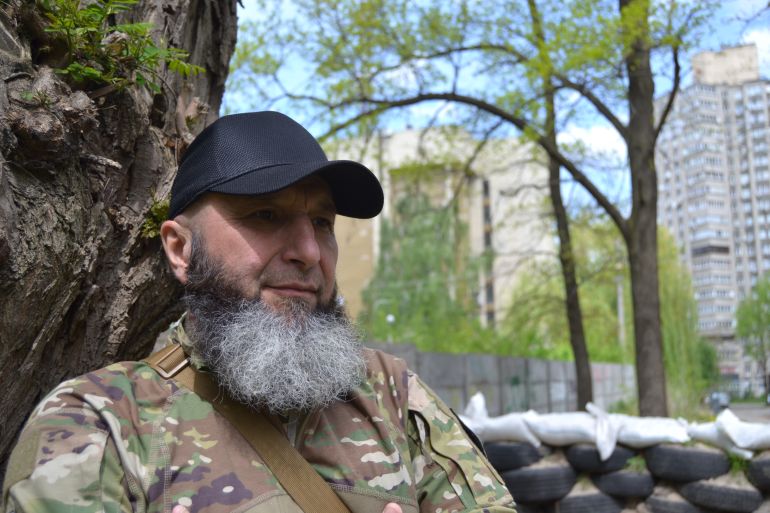
Kharkiv, Ukraine – Ali Khadzali stands among the blown-out buildings of his hometown, Kharkiv, about 50 kilometres (31 miles) from Ukraine’s border with Russia.
Since Russia’s full-scale invasion began in February, Khadzali has worked with a team of six volunteers to provide humanitarian assistance and evacuate people from areas hit hard by the fighting.
Keep reading
list of 4 itemsUkraine says it shot down Russian strategic bomber after strike kills nine
Russia doesn’t have capability to knock Ukraine out of war: Ex-US commander
Russia-Ukraine war: List of key events, day 785
Khadzali, a warm, charming 30-year-old, wears a skullcap, a hoodie, and cargo pants. He is on a break between the day’s duties early one afternoon in mid-May. Russian forces have been pushed back from the city, but intense shelling has reduced much of the northern suburbs to debris.
The distant rumble of artillery still reverberates through this now empty neighbourhood. Nearby, a large playground with colourful swings and seesaws is strangely intact, framed by high-rise buildings blackened and scarred by weeks of bombardment.
Khadzali was born in Kharkiv, Ukraine’s second-largest city, to a Ukrainian mother and a Syrian father. He would regularly visit Syria until war broke out there in 2011. In 2015, Russia’s intervention in Syria’s now 11-year-old civil war tipped the scales in favour of the Assad regime.
“Both of my homelands, Ukraine and Syria, were invaded by Russians,” Khadzali says.
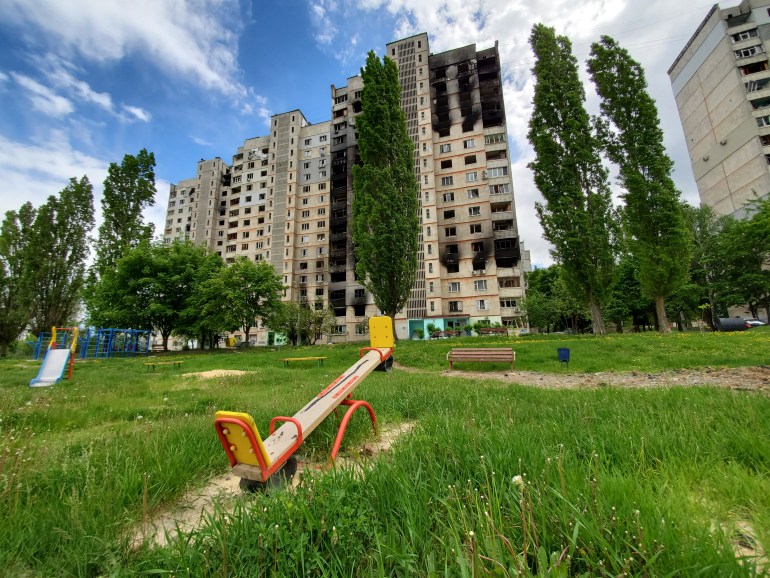
Joining the war effort
In 2015, Khadzali became a chaplain – an imam offering spiritual services within a military context.
The previous year, the Maidan revolution saw Ukrainians take to the streets to protest against the pro-Russian government of President Victor Yanukovych. His forces responded with a brutal crackdown that killed more than 100 protesters and injured thousands. Yanukovych was overthrown and soon after, Russian-backed separatists took up arms in the Donbas regions of Donetsk and Luhansk, beginning an eight-year war and precursor to Russia’s invasion in February 2022.
Spurred on by his “Islamic brothers” to take on the new role, Khadzali had wanted to find a way to help his country and felt that he could best do that by supporting the small number of Muslim troops scattered in the Donbas. “What could be a better way than playing a part that connects with the army in a country at war?” says Khadzali.
As a chaplain, he led prayers, ensured the provision of halal foods, and offered religious instruction, psychological support, and guidance about human rights to troops. “Simply talking with troops,” he says, has been a crucial part of his duty. “That may even be the most important thing.”
He still carries out these duties, but today his role is even higher stakes – he often spends his time helping people in dangerous front-line areas.
“We have a list of people in need of help, and we check up on them weekly,” he says. “For example, we get medicine to elderly people who need it, and groceries … When you help one family, your telephone number gets to 10 families who need aid.”
Although Muslims make up only about 1 percent of the predominantly Christian country of 44 million people, many have joined the war effort following Russia’s invasion. Many are driven by a history of Russian injustices against Muslim communities and support for what is seen as an open and tolerant Ukraine.
The majority of Ukraine’s Muslim population are Crimean Tatars, Sunni Muslims of Turkic origin. For those who fight, it is also a fight to return to their homeland, Crimea – a peninsula of steppe land jutting out into the Black Sea and buttressed by mountains in the south – annexed by Russia in 2014.

Crimean Tatars: tortured recent past
Islam has a long and important history in Ukraine not only as a religion brought by itinerant traders and missionaries and sustained by pockets of minority communities but as the basis of statecraft. As the religion of the Crimean Khanate, which lasted from the 15th to 18th century, Islam left an indelible political and cultural imprint.
Yet Crimean Tatars have a tortured recent past. During the second world war, Stalin tolerated no threat, real or perceived, and deported entire populations deemed to have collaborated with the Nazis to other regions within the vastness of the Soviet empire.
Among those targeted were the Muslim populations of Chechnya and Ingushetia – today both Russian republics in the northern Caucasus – who were forcibly removed from their homelands in 1944.
Today, Chechen soldiers fight on both sides of the Russia-Ukraine conflict – a mini proxy war within a war, pitting the troops of Chechen strongman and Putin loyalist Ramzan Kadyrov against Chechens sympathetic to the separatist movements of their homeland.
Chechens fighting on Ukraine’s side, mostly as foreign volunteers, see an opportunity for revenge after two bloody wars for independence that started in 1994, following the breakup of the Soviet Union, and lasted until 2009 and saw Russian forces raze the Chechen capital, Grozny, to the ground.
On May 18, 1944, just days after the Red Army drove Axis forces from Crimea, Crimean Tatars were collectively rounded up by the secret police and deported, accused of Nazi collaboration. Even Crimean Tatars in the Red Army and those with the status of “Heroes of the Soviet Union” were not spared.
Families were thrown into sealed, airless cattle wagons and exiled to remote parts of the Soviet Union, mostly in Uzbekistan.
The entire population of roughly 200,000 Crimean Tatars was hauled off. Thousands died on the arduous journey, and many thousands more from malnutrition and disease on the collective farms and prison-like labour camps they were sent to.
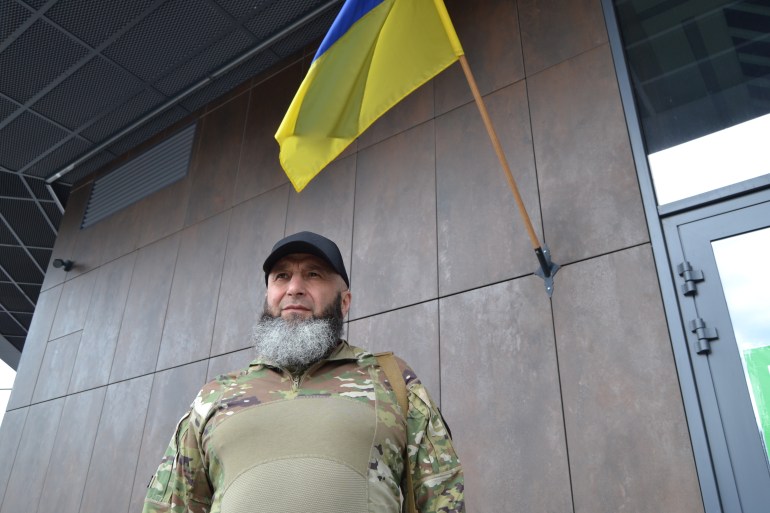
‘Soviet collar’
The family of Isa Akaev, a commander of a volunteer unit serving in Ukraine, was among those sent from Crimea to a collective farm 100km (62 miles) from Samarkand in Uzbekistan.
Akaev, 57, stocky, bearded and pious, is a father to 13 children and a father figure to a larger group of fighters. During a break from his duties in the capital Kyiv, he recalls first learning about the deportations in the 1970s in Uzbekistan where he grew up.
He was about 10 years old, and an ardent member of the Young Pioneers – the Soviet answer to the Scout movement that groomed children for a future in the Communist Party.
He had visited his homeland of Crimea to attend a Pioneer camp, and at a cultural show-and-tell said to his teacher that he would bring something to represent his Crimean Tatar heritage, only to be told that there was no such thing.
When Akaev returned to Uzbekistan, confused, he went to his mother, who though upset told him to ignore the incident. Among many expelled families, communal exile was a long-suppressed secret. Some preferred not to unearth old traumas. Others did not want to draw attention to themselves by retelling an unsanctioned history.
But Akaev’s grandmother, perhaps more defiant and weary of self-censorship in her later years, told him the full story.
She once pointed to the red Pioneer scarf he proudly wore around his neck and called it a “Soviet collar”. He never wore it in front of her again.
“She often spoke of Crimea,” says Akaev of his grandmother, “about its beauty, its nature, and about its seaside,” long beloved by the Russian elite as a setting for their luxury dachas.
While post-Maidan Ukraine has recognised the deportations as genocide, Russia has been reluctant to let Crimean Tatars remember their history as they choose. On May 18, 2014, thousands in Crimea defied a ban to attend rallies to mark the 70th anniversary of the deportations amid a heavy police presence.
Fight to return home
In February 2014, as Russia was preparing to annex Crimea, Akaev, who ran a business selling metal roofing, wanted to form a militia to fight the Russian occupation.
Ill-prepared, the Ukrainian army gave up the peninsula almost without any fight. Many commanders were nowhere to be found or sided with Russia, like the second in command of the Ukrainian navy.
Akeav says he tried to appeal to local Crimean leaders to support an armed resistance but says those efforts got nowhere. Before long, he realised he was being followed by what he believed were Russian agents.
He decided to flee to mainland Ukraine, setting off from the Crimean capital of Simferopol in a dramatic escape.
“I bought a ticket from Simferopol and boarded the train in Dzhankoy, the next stop after Simferopol,” he says. “I went to the fitting room in a nearby store, changed my clothes, my colleague put on my clothes, and those who were watching followed him, he got into my car. I came out of the fitting room in his clothes.”
For Akaev and his family, and about 30,000 Crimean Tatars who have fled Crimea since 2014, this is a repeat exile.
“God says to fight those who have driven you from your homes. For me, this is the motivation to fight Russia … We have to return to Crimea, and we will return.”
Shortly after leaving Crimea, Akaev helped set up a small squad with Muslim fighters to fight alongside the Ukrainian armed forces in Donbas.
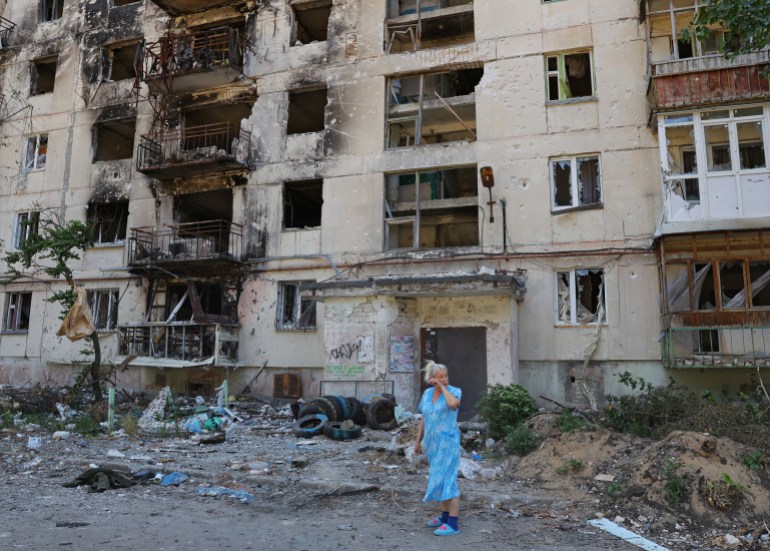
Crimea squad
At the beginning of Russia’s invasion in 2022, Akaev released a video in which he is surrounded by masked, armed comrades. He urges Muslims not to fight for Russia in this war, warning those who do that “there is a lot of land in Ukraine, and there will be enough space to bury everyone.”
His detachment, called Crimea, was about 15 fighters strong at the start of Russia’s full-scale invasion, and now has about 50 mostly Muslim Crimean Tatar combatants. Akaev says they largely do reconnaissance work, scout newly liberated areas for remaining Russian soldiers and other threats, and operate checkpoints.
As Russian forces began withdrawing from around Kyiv in late March, his men were among the first to enter the village of Motyzhyn, where they came across the grizzly scene of likely war crimes – a mass grave with bodies of civilians allegedly tortured and executed by Russian troops who had served in Syria. The head of the village council, who had stayed to coordinate the defence of the area, was among those killed, alongside her husband and son.
“Our guys in the reconnaissance discovered this as they were walking in the woods, searching for Russians left behind, and one of the fighters noticed that a hand was sticking out of the ground,” Akaev says. As he cleared the dirt with his foot he saw the body. “And then they found the corpses of other people.”
Said Ismagilov, 43, lives about 40km (25 miles) away in another place that has become synonymous with Russian atrocities – Bucha. He moved there from war-torn Donbas in 2014, after his hometown of Donetsk was taken over by pro-Russian separatists.
The day after Russian troops pulled out of the Kyiv region, Ismagilov returned to his apartment, which had been thoroughly wrecked by occupying soldiers.
For 13 years, Ismagilov was one of the most influential Muslim leaders in Ukraine – the Mufti of the Ukrainian “umma” for the country’s community of Sunni Muslims. Around the time his term ended in March, Ismagilov turned in his religious robes and turban for a set of standard-issue military fatigues. In a picture taken in the first weeks of the war, the bespectacled former Mufti sits smiling among comrades in camouflage, a yellow band wrapped around his right arm identifying him as a member of Ukraine’s Territorial Defence Force.
Ismagilov has been in the thick of the war in the Donbas, driving a truck transporting medics and evacuating the wounded.
“I am of more use to my country doing this than if I were closing my eyes in quiet prayer somewhere far removed from the conflict zone,” he tells Al Jazeera by phone speaking near the city of Lysychansk before it was taken by Russia.
He has appealed to Muslims across the world to denounce Putin’s “unjust war of aggression” in an online video. “Support Ukraine, support with funds, support with information, support militarily,” he said.
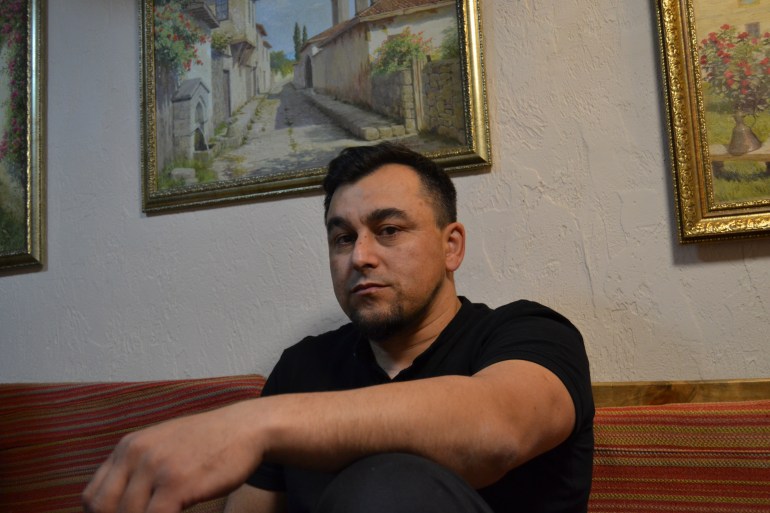
Repression has touched all Crimean Tatar families
Like Akaev, Ismail Ramazanov’s fight against Russia began after it annexed Crimea.
“I left my small homeland to protect my big homeland. I know that without a free Ukraine, there will be no free Crimea,” the 36-year-old tells Al Jazeera.
Ramazanov sits with his friend, Anna Eismont, an activist, at a café in downtown Kyiv, and speaks over traditional Crimean Tatar pastries and tea.
He recounts how as an activist and citizen journalist he drew attention to the plight of political prisoners in Crimea. He recorded arrests and harassment of activists by Russian authorities, organised flash mobs and other protests, and collected bail money for arrested dissidents. As an act of defiance, he and other activists regularly collected fines in coins and handed them over in plastic bags or buckets to frustrate officials.
But he also drew the attention of the Russian Federal Security Service (FSB) and ended up in prison for his political activities. In January 2018, in the early hours of the morning, Ramazanov was dragged from his family home by FSB agents, blindfolded, bundled into a white van, and taken away. He was badly beaten before his pretrial hearing the next day and imprisoned for six months while awaiting trial.
Ramazanov says FSB agents tried to frame him by placing pistol cartridges and “extremist” literature in his house, and he faced charges of “incitement to enmity or hatred” under laws used to target independent voices.
Russian authorities crack down on critics by branding them as “extremists” and “terrorists” according to human rights organisations.
According to the Kharkiv Human Rights Protection Group, one of the oldest rights organisations operating in Ukraine, such tactics are a common response to criticism of Russia’s annexation of Crimea. Since annexation, stories of abduction have become commonplace. Entire families have been harassed and intimidated to silence individuals. As of May 2022, there were 123 documented Crimean political prisoners – 98 of them Crimean Tatars, according to the rights group Crimea SOS.
“There is no Crimean Tatar family that Russian repression has not touched,” says Ramazanov.
A modest change in the law allowed his lawyers to eventually get the case against him withdrawn a year after his arrest and he left for the mainland.
When the full-scale war broke out, Ramazanov joined a volunteer unit of the Territorial Defence Force safeguarding and patrolling the Kyiv region. “I’m part of a much larger effort now,” he says.
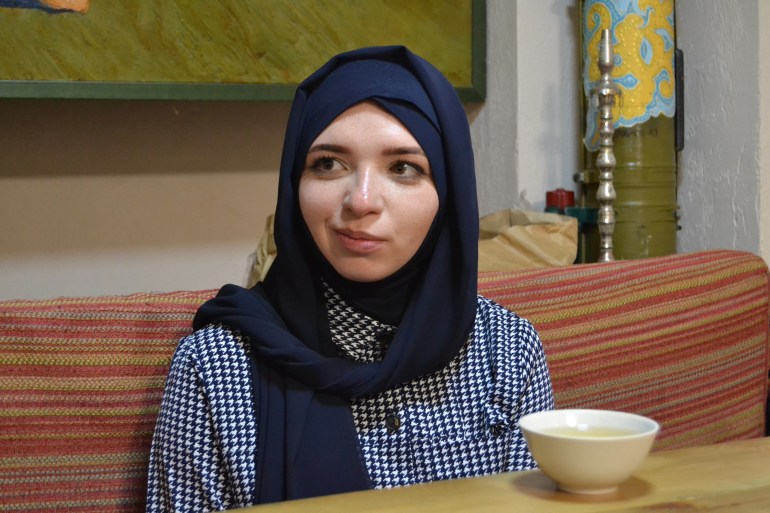
Sourcing drones for the troops
Eismont has also joined the war effort. The shy-but-determined 26-year-old has been working behind the scenes as an activist sourcing goods and raising funds.
She has been an activist ever since she joined the Maidan revolution at 18.
Working independently and through Ukraine-based aid organisation Anomaly, she has been actively procuring medical supplies, vehicles, food, drones, thermal imaging devices and other equipment for troops, which she personally sorts and checks.
“I sent first aid kits to soldiers in Chernihiv, and when I saw the photos of them with the kit, I felt like there was a part of me there with them,” she says with pride.
During the Maidan revolution, Eismont, like so many of her peers, was eager to play her part in changing the course of Ukrainian history. A close Muslim friend she met during the revolution, who later died fighting in the war in Donbas, played an outsized role in her path since, and, her conversion last year to Islam.
During the height of violence in Maidan, her friend sent her far from the square to collect something. She later realised he had wanted to keep her away from danger.
Although she spent much of her childhood in Crimea, it was only after annexation that she became immersed in Crimean Tatar culture through activism to support Crimean Tatar families.
“I helped several families from Crimea to move and adapt to life in Kyiv,” she says.
In 2019, she stepped up her efforts to help Crimean Tatar families together with Anomaly’s team of foreign volunteers – what she calls “a kind of international volunteer battalion”. They taught English courses for Crimean Tatars and their families, soldiers, volunteers and regular people, she says. Alongside this, “it was brick by brick, and I gradually came to understand that I wanted to convert,” she says.
It was through one such course that she met Ramazanov, who was a student, and a strong bond between the two was forged by activism and volunteer work.
Eismont and Ramazanov’s social media posts show frequent appeals for donations and a steady stream of military supplies being sent to the front, with Ramazanov often making the deliveries.
Their focus lately has been on supplying drones, which play a key reconnaissance role on a battlefield. So far, Anna has sent drones to battalions in Kherson, Mykolaiv, Zaporizhia, Izyum, and earlier, around Mariupol.
The returnees
In Crimea, generations of Russian imperial and later Soviet rule led to the Russification of the peninsula, with Russian immigrants taking over Crimean Tatar houses left empty by the deportations. Ethnic Russians are by far the largest group, followed by Ukrainians and then Crimean Tatars, who make up a little more than 10 percent of the total.
The memories of Soviet oppression still haunt many Crimean Tatars. After Stalin’s collective punishment, oppression under Putin is just a new chapter in a history of persecution.
For younger Crimean Tatars who were born after repatriation following the collapse of the Soviet Union, the intergenerational wounds still feel raw. Deported communities like Chechens were allowed to return earlier, but the ban on Crimean Tatars returning was not lifted until 45 years after their exile.
Ismail Kurt-Umer was born in 1991 in Crimea and grew up in Bakhchysarai, the ancient Khanate capital, as Crimean Tatar families were making their historic journeys home.
For many returnees, the trip back was only the beginning of a very challenging adjustment. Foreigners in their homeland, Crimean Tatars’ marginalisation combined with engrained falsehoods about historical betrayal meant families were unwelcome and struggled to find homes and jobs.
“Other Crimeans could be very hostile to us returnees, and many seemed to believe the propaganda all those years later, seeing us as traitors,” says Kurt-Umer.
Kurt-Umer was born in the year of Ukraine’s independence at a time when society was opening up and challenging old prejudices. Unlike so many of the older generation, he grew up hearing stories of the hardships of exile.
His grandfather was a decorated soldier in the Red Army and fought during most of the second world war, but was given just three days to leave Crimea after he returned. The Soviet Union, perfectly content to draw fighters from among those it had condemned as traitors, sent Kurt-Umer’s father to fight in the Soviet invasion of Afghanistan from 1979 to 1989.
In 2014 Kurt-Umer joined Ukraine’s army, but as a classically trained singer in the military ensemble.
“Looking back,” Kurt-Umer says, “I think something in me wanted to be part of the armed forces because of the annexation. Everyone has a duty now, and I may not carry a gun but I contribute in a different way.”
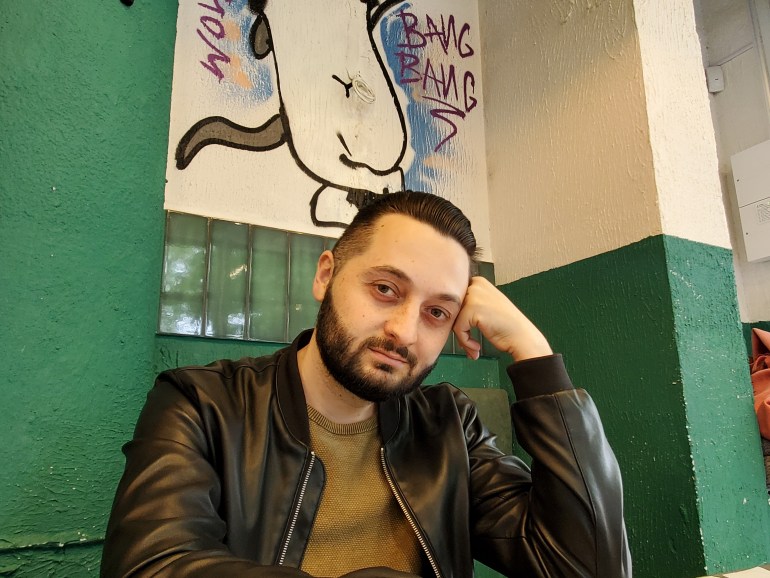
Singing for Crimea and Ukraine
Like Eismont, Kurt-Umer is part of the generation who came of age during the Maidan revolution and Ukraine’s pivot away from Russia. For several years, he would sing at events commemorating the months-long uprising, performing the Ukrainian traditional song, Plyve Kacha, about a mother and her son who is departing for war, as a requiem.
Since Russia’s invasion, Kurt-Umer has been touring and performing with the band and recording music videos. He sees his role as part of a national effort to build morale and instil a sense of Ukrainianness in people’s hearts.
On a sunny spring morning in May, Kurt-Umer sat in a café in downtown Kyiv. The chestnut trees were in bloom, and the streets were filling up again.
In sharp contrast to his bold stage persona, Kurt-Umer is pensive, almost shy. In a video from earlier this year, Kurt-Umer sings a militaristic version of the Salawat at the head of his army band, his echoey muezzin’s voice set against the heavy beat of drums.
Kurt-Umer has been introduced as a Crimean Tatar at performances and has been moved by the reception he and the ensemble have received on tours of the country – here was the army of an overwhelmingly Christian nation foregrounding its Islamic and Crimean Tatar heritage.
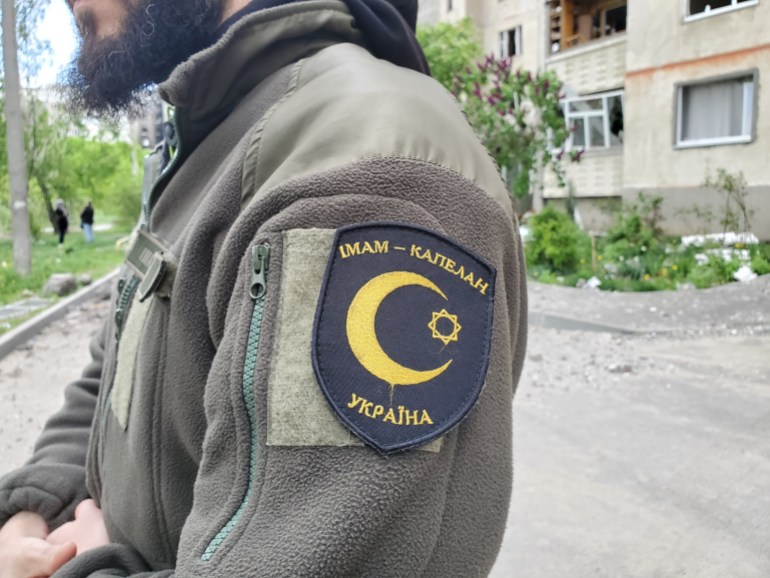
A battle for freedom
For many of Ukraine’s Muslims, the country’s religious tolerance and move towards more open, democratic politics also lies behind their support.
“Ukraine is a country fighting not only for its independence but for the ideas of freedom and democracy in general,” Akaev says.
Crimean Tatars and others who have been at the sharp end of Russian imperialism say they know what is at stake in this war.
Ukraine is far from perfect, Ismagilov says, and there is much to be done to build trust between different faiths. “But Muslims are well aware of what will happen if Russia occupies their territories,” he says. “It will be the same as in the Russian-occupied Crimea, where Muslims are disappeared and given long prison terms.”
For Khadzali and others, the war has shown the strength of a united society. It has brought people together, says Eismont, and brought about the solidarity that Crimean Tatars, having endured all “the troubles together”, already shared.
“Only together you can win and survive. This is what we Ukrainians lacked,” she says. “We as a nation realised this with the beginning of the full-scale war. When trouble came to every home, the war became painful for every Ukrainian – and we are united now.”